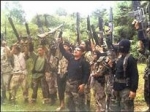06 December 2007
Philippine Catholics Afraid of Muslim Homeland Deal
 (alertnet.org) When Christians in the southern Philippines heard that the government and Islamic rebels had agreed to expand...
(alertnet.org) When Christians in the southern Philippines heard that the government and Islamic rebels had agreed to expand...
DATU BLAH SINSUAT, Philippines, Dec 5 (Reuters) - When Christians in the southern Philippines heard that the government and Islamic rebels had agreed to expand a homeland for Muslims on their island, they panicked.
"We started buying some weapons to defend our families and community," said Berting, a coconut farmer, whose farm sits in the heart of a mainly Muslim province in the southern Philippine island of Mindanao.
Berting, who declined to give his last name, is a Catholic whose grandfather settled in the area nearly 80 years ago when Christian farmers moved to the lush jungles and valleys of mostly Muslim Mindanao.
A conflict between Catholics and Muslims has raged on the island for the past 40 years, resulting in the deaths of 120,000 people. But now the sides say that they are close to a final peace deal and might sign an agreement next year.
After a decade of stop-start negotiations, the government and the country's largest Islamic rebel group agreed last month on the boundaries of a proposed homeland for Muslims, who make up around 20 percent of Mindanao's population.
The thought chills Berting.
"If things don't turn out that well, we might sell what we have here and move to my wife's place in another part of Mindanao. My neighbours were thinking the same thing, we'll leave this place and re-settle elsewhere."
In the 1960s, Muslims and Catholic militia groups fought violent wars over land ownership as the Christian settlers started to outnumber the original inhabitants.
"We don't want to go back to those days," said Moner Bajunaid, head of an Islamic education organistion in Mindanao.
"There must be real efforts by the two sides to allay the fears of the Christian settlers that their Muslim neighbours will reclaim their homes and farms."
OPEN TO ALL
Local politicians in nearby North Cotabato province, where hundreds of Muslim-dominated villages will be included in a proposed ancestral domain, said Berting's reaction reflected common fears within the minority Christian communities.
"It's bad news," Mohaqher Iqbal, chief peace negotiator of the MILF rebel group, told Reuters at the rebels' camp.
"We never intended to separate the Muslims and Christians ... Our doors are open to all," he said.
About five percent of the Philippines estimated 89 million people are Muslims, and about 81 percent of the population are Catholic.
In a two-day meeting in Kuala Lumpur last month, negotiators for the government and the MILF agreed to mark the land and sea boundaries of the Bangsamoro Juridical Entity (BJE), which refers to the areas that will be covered by the proposed ancestral homeland for Muslims in the south.
The new borders will expand the six provinces and one city covered by the Autonomous Region in Muslim Mindanao (ARMM).
The ARMM was created in 1989 based on an agreement with the older Moro National Liberation Front (MNLF). But the MNLF are not happy with the prospect of being supplanted by the MILF and the two groups have yet to work out a compromise.
Smoothing over differences with fellow rebels is just one of the potential hurdles to a final, historic deal.
The issue of governance, which has yet to be agreed, could also spell trouble. Powerful southern-based political clans would likely use force to prevent any loss of influence in one of the most resource rich areas of the country.
Military commanders with a vested interest in maintaining the conflict to boost their powers and careers may be another factor.
In an apparent sign the rebels were being more pragmatic, Iqbal said only about half of the 613 villages the government had initially suggested be part of the ancestral homeland would be included in the BJE because the other areas were too far away, Iqbal said the new map would be unveiled in January 2008 after the text of the deal is finalised this month.
That prospect frightens many Catholic settlers.
"We don't want that day to happen," Berting said, showing three rifles he bought on the black market.
"We'll defend our farms." (Editing by Carmel Crimmins and Megan Goldin)
08:28 Posted in Real Islam | Permalink | Comments (0) | ![]() Facebook |
Facebook |



















The comments are closed.